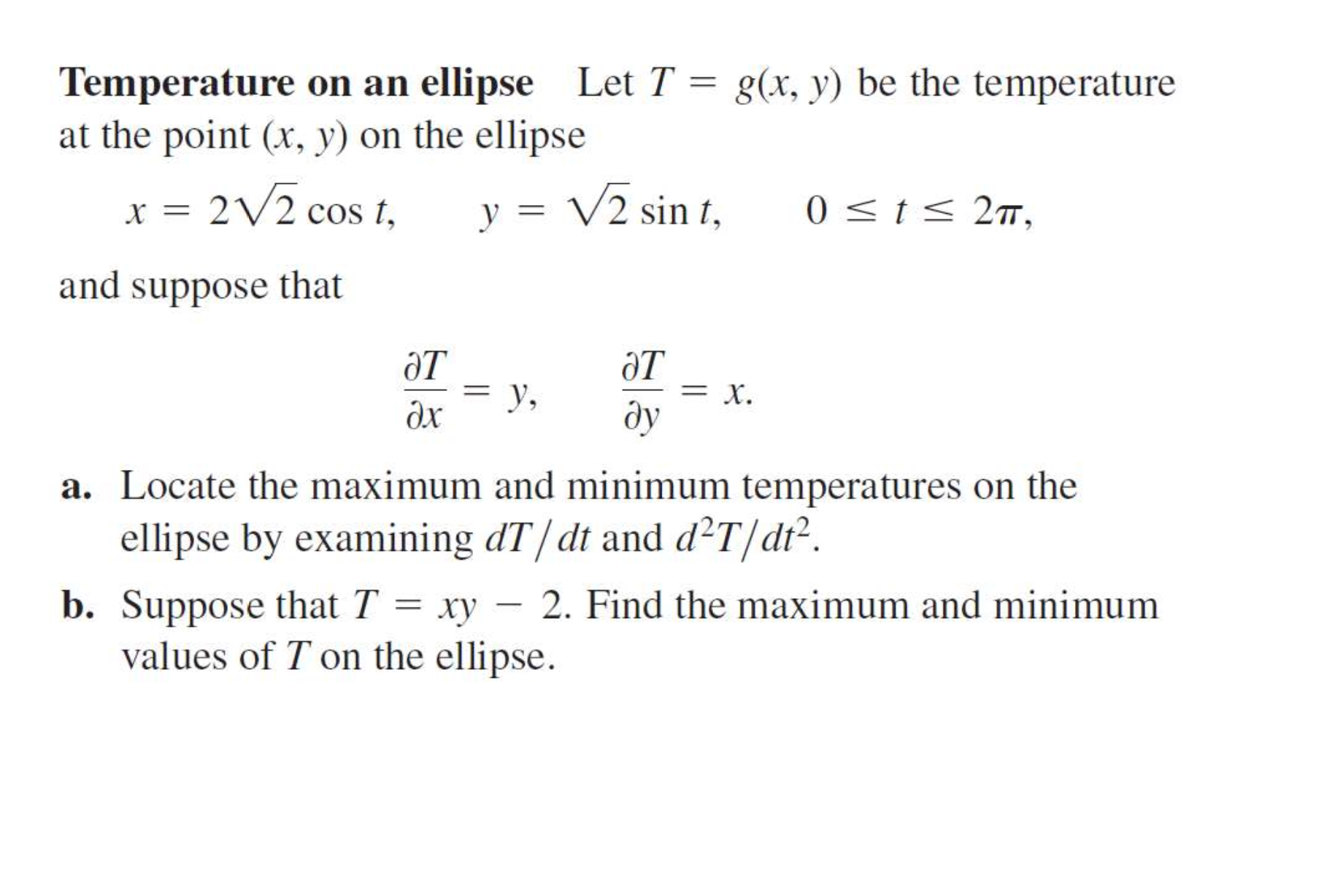Locate the maximum and minimum temperatures on the ellipse by examining dT/dt and d2T/dt2. Suppose that T = xy - 2. Find the maximum and minimum values of T on the ellipse.

Understand the Problem
The question is about analyzing the temperature at points on an ellipse defined parametrically. It asks to locate maximum and minimum temperatures using derivatives and also to find the maximum and minimum of a specific temperature function on the ellipse.
Answer
Maximum temperature: $2$, Minimum temperature: $-6$.
Answer for screen readers
The maximum temperature ( T ) on the ellipse is ( 2 ), and the minimum temperature is ( -6 ).
Steps to Solve
- Calculate ( \frac{dT}{dt} )
Using the parametric equations of the ellipse ( x = 2\sqrt{2} \cos t ) and ( y = \sqrt{2} \sin t ), we can find ( T ) implicitly defined by ( \frac{dT}{dt} = \frac{\partial T}{\partial x} \frac{dx}{dt} + \frac{\partial T}{\partial y} \frac{dy}{dt} ).
Given ( \frac{\partial T}{\partial x} = y ) and ( \frac{\partial T}{\partial y} = x ), we first compute ( \frac{dx}{dt} ) and ( \frac{dy}{dt} ):
[ \frac{dx}{dt} = -2\sqrt{2} \sin t ] [ \frac{dy}{dt} = \sqrt{2} \cos t ]
Substituting the derivatives and ( \frac{\partial T}{\partial x} ) and ( \frac{\partial T}{\partial y} ):
$$ \frac{dT}{dt} = y \cdot (-2\sqrt{2} \sin t) + x \cdot (\sqrt{2} \cos t) $$
- Substitute ( x ) and ( y )
Now, substitute ( x ) and ( y ) in the equation:
[ y = \sqrt{2} \sin t \quad \text{and} \quad x = 2\sqrt{2} \cos t ]
Then,
$$ \frac{dT}{dt} = (\sqrt{2} \sin t)(-2\sqrt{2} \sin t) + (2\sqrt{2} \cos t)(\sqrt{2} \cos t) $$
Simplifying gives:
$$ \frac{dT}{dt} = -4 \sin^2 t + 2\cdot2 \cos^2 t = -4 \sin^2 t + 4 \cos^2 t $$
- Set ( \frac{dT}{dt} = 0 )
To find critical points, set the derivative equal to zero:
$$ -4 \sin^2 t + 4 \cos^2 t = 0 $$
This simplifies to:
$$ \sin^2 t = \cos^2 t $$
Thus,
$$ \tan^2 t = 1 \quad \Rightarrow \quad t = \frac{\pi}{4}, \frac{3\pi}{4}, \frac{5\pi}{4}, \frac{7\pi}{4} $$
- Calculate ( \frac{d^2 T}{dt^2} )
Next, compute the second derivative to identify the nature of these critical points. First, differentiate ( \frac{dT}{dt} ):
$$ \frac{d^2T}{dt^2} = \frac{d}{dt}(-4 \sin^2 t + 4 \cos^2 t) = -8 \sin t \cos t $$
- Evaluate ( \frac{d^2 T}{dt^2} ) at critical points
Evaluate ( \frac{d^2T}{dt^2} ) at each critical point:
- For ( t = \frac{\pi}{4} ) and ( t = \frac{5\pi}{4} ):
$$ \frac{d^2T}{dt^2} = -8 \cdot \frac{\sqrt{2}}{2} \cdot \frac{\sqrt{2}}{2} = -8 \cdot \frac{1}{2} = -4 \quad (\text{local max}) $$
- For ( t = \frac{3\pi}{4} ) and ( t = \frac{7\pi}{4} ):
$$ \frac{d^2T}{dt^2} = -8 \cdot \frac{\sqrt{2}}{2} \cdot -\frac{\sqrt{2}}{2} = 8 \cdot \frac{1}{2} = 4 \quad (\text{local min}) $$
- Find temperatures ( T ) at critical points
Now, substitute back to find temperatures at critical points:
- At ( t = \frac{\pi}{4} ) and ( t = \frac{5\pi}{4} ):
$$ T = xy - 2 = (2\sqrt{2} \cdot \sqrt{2}) - 2 = 4 - 2 = 2 \text{ (max)} $$
- At ( t = \frac{3\pi}{4} ) and ( t = \frac{7\pi}{4} ):
$$ T = xy - 2 = (2\sqrt{2} \cdot -\sqrt{2}) - 2 = -4 - 2 = -6 \text{ (min)} $$
The maximum temperature ( T ) on the ellipse is ( 2 ), and the minimum temperature is ( -6 ).
More Information
The problem combines parametric equations with calculus concepts of derivatives to find extreme values. The approach relies on understanding how temperature changes with respect to time on given parametric curves.
Tips
- Neglecting to check the second derivative can lead to incorrect identification of maxima and minima.
- Not validating that the endpoints/stationary points are within the range ( 0 \leq t \leq 2\pi ).
AI-generated content may contain errors. Please verify critical information